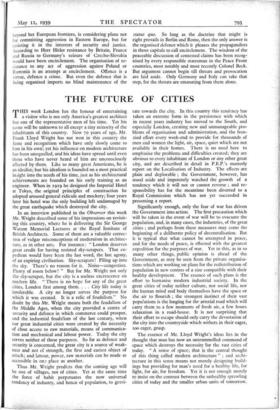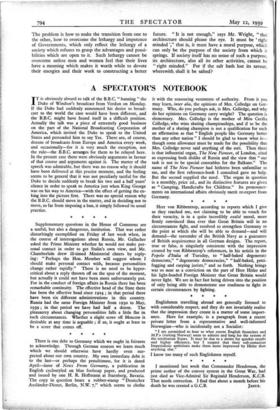THE FUTURE OF CITIES
THIS week London has the honour of entertaining a visitor who is not only America's greatest architect but one of the representative men of his time. Yet his name will be unknown to all except a tiny minority of the inhabitants of this country. Now 70 years of age, Mr. Frank I`loyd Wright has not won in this country the fame and recognition which have only slowly come to him in his own; yet his influence on modern architecture has been unequalled, and his ideas have spread until even those who have never heard of him are unconsciously affected by them. Like so many great Americans, he is an idealist; but his idealism is founded on a most practical insight into the needs of his time, just as his architectural achievements are founded on his early training as an engineer. When in 1919 he designed the Imperial Hotel at Tokyo, the original principles of construction he adopted aroused general ridicule and mockery; four years later his hotel was the only building left undamaged by the great earthquake which destroyed the city.
In an interview published in the Observer this week Mr. Wright described some of his impressions on revisit- ing this country, where he is delivering the Sir George Watson Memorial Lectures at the Royal Institute of British Architects. Some of theni are a valuable correc- tion of vulgar misconceptions of modernism in architec- ture, as in other arts. For instance : " London deserves great credit for having resisted sky-scrapers. That ex- pedient would have been the last word, the last agony, of an expiring civilisation. Sky-scrapers ! Piling up into the sky. There's no reason for it. Noise—congestion. Plenty of room below ! " But for Mr. Wright not only the sky-scraper, but the city is a useless excrescence on modern life. " There is no hope for any of the great cities, London first among them. . . . City life today is intolerable. A city no longer serves the purpose for which it was created. It is a relic of feudalism." No doubt by this Mr. Wright means both the feudalism of the Middle Ages, when the city provided a centre of security and defence in which commerce could prosper, and the industrial feudalism of the last century, when our great industrial cities were created by the necessity of close access to raw materials, means of communica- tion and mechanical and labour power. Today the city serves neither of these purposes. So far as defence and security is concerned, the great city is a source of weak- ness and not of strength, the first and easiest object of attack; and labour, power, raw materials can be made as accessible in one place as another.
Thus Mr. Wright predicts that the coming age will be one of villages, not of cities. Yet at the same time the force of habit perpetuates the now universal tendency of industry, and hence of population, to gravi- tate towards the city. In this country this tendency has taken an extreme form in the persistence with which in recent years industry has moved to the South, and especially London, creating new and unmanageable pro- blems of organisation and administration, and the fren- zied effort every week-end to provide for thousands of men and women the light, air, space, quiet which are not available in their homes. There is no need here to emphasise the problems and difficulties created; they are obvious to every inhabitant of London or any other great city, and are described in detail in P.E.P.'s masterly report on the Localisation of Industry. The effects are plain and deplorable ; the Government, however, has stood aside and impotently watched the growth of a tendency which it will not or cannot reverse ; and re- sponsibility has for the meantime been diverted to a Royal Commission which has not yet succeeded in presenting a report.
Significantly enough, only the fear of war has driven the Government into action. The first precaution which will be taken in the event of war will be to evacuate the population, and, in many cases, the industries, of the great cities ; and perhaps from these measures may come the beginning of a deliberate policy of decentralisation. But it is typical that what cannot be attempted in peace, and for the needs of peace, is effected with the greatest expedition for the purposes of war. Yet in this, as in so many other things, public opinion is ahead of the Government, as may be seen from the private organisa- tions which are working on plans for the redistribution of population in new centres of a size compatible with their healthy development. The essence of such plans is the effort to humanise modern industrial society. In the great cities of today neither culture, nor social life, nor the human mind and body themselves have the space or the air to flourish ; the strongest instinct of their vast populations is the longing for the arterial road which will carry them to a few moments of fresh air, a few hours relaxation in a road-house. It is not surprising that their effort to escape should only carry the devastation of the city into the countryside which withers in their eager, too eager, grasp.
The essence of Mr. Lloyd Wright's ideas lies in the thought that man has now an untrammelled command of space which destroys the necessity for the vast cities of today. " A sense of space; that is the central thought of this thing called modern architecture " ; and archi- tecture in this sense means not merely designing build- ings but providing for man's need for a healthy life, for light, for air; for freedom. Yet it is not enough merely to insist on the contrast between the unhealthy sprawling cities of today and the smaller urban units of tomorrow. The problem is how to make the transition from one to the other, how to overcome the lethargy and impotence of Governments, which only reflect the lethargy of a society which refuses to grasp the advantages and possi- bilities which are open to it. Such lethargy cannot be overcome unless men and women feel that their lives have a meaning which makes it worth while to devote their energies and their work to constructing a better future. " It is not enough," says Mr. Wright, " that architecture should please the eye. It must be ' right minded '," that is, it must have a moral purpose, which can only be the purpose of the society from which it springs. If society itself has no sense of such a purpose, its architecture, also all its other activities, cannot be " right minded." For if the salt hath lost its savour, wherewith shall it be salted?



















































 Previous page
Previous page